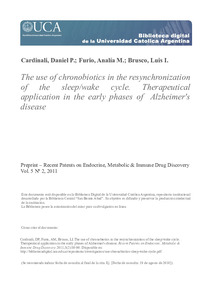Por favor, use este identificador para citar o enlazar este ítem:
https://repositorio.uca.edu.ar/handle/123456789/1661| Título: | The use of chronobiotics in the resynchronization of the sleep/wake cycle : therapeutical application in the early phases of Alzheimer's disease | Autor: | Cardinali, Daniel Pedro Furio, Analía M. Brusco, Luis I. |
Palabras clave: | ENFERMEDAD DE ALZHEIMER; RITMO CIRCADIANO; MELATONINA | Fecha de publicación: | 2011 | Editorial: | Bentham Science | Cita: | Cardinali, D. P., Furio, A. M., Brusco, L.I. The use of chronobiotics in the resynchronization of the sleep/wake cycle : therapeutical application in the early phases of Alzheimer's disease [en línea]. Preprint de artículo publicado en Recent Patents on Endocrine, Metabolic & Immune Drug Discovery. 2011, 5 (2). doi:10.2174/187221411799015354. Disponible en: https://repositorio.uca.edu.ar/handle/123456789/1661 | Resumen: | Abstract: Treatment of circadian rhythm disorders, whether precipitated by intrinsic factors (e.g., sleep disorders, blindness, mental disorders, aging) or by extrinsic factors (e.g., shift work, jet-lag) has led to the development of a new type of agents called “chronobiotics”. The term “chronobiotic” defines a substance displaying the therapeutic activity of shifting the phase or increasing the amplitude of the circadian rhythms. The prototype of this therapeutic group is melatonin, whose administration synchronizes the sleep-wake cycle in blind people and in individuals suffering from circadian rhythm sleep disorders, like delayed sleep phase syndrome, jet lag or shift-work. Daily melatonin production decreases with age, and in several pathologies, attaining its lowest values in Alzheimer’s disease (AD) patients. About half of dementia patients have severe disruptions in their sleepwakefulness cycle. Melatonin replacement is effective to treat sundowning and other sleep wake disorders in fully developed AD, although controversial data on this point exist. Indeed, large interindividual differences between patients suffering from AD exist and can explain these erratic results. Theoretically the effect of melatonin could be more consistent at an earlier stage of the disease, i.e., mild cognitive impairment (MCI), an etiologically heterogeneous syndrome that precedes dementia. PubMed was searched using Entrez for articles including clinical trials. Search terms were “Alzheimer” “mild cognitive impairment” and “melatonin”. Full publications were obtained and references were checked for additional material where appropriate. Only clinical studies with empirical treatment data were reviewed. Five double blind, randomized placebo controlled trials and 1 open label retrospective study (N= 651) all agree in indicating that treatment with daily evening melatonin improves sleep quality and cognitive performance in MCI. The analysis of published evidence and patents indicates that melatonin can be a useful ad-on therapeutic tool in the early phases of AD. | URI: | https://repositorio.uca.edu.ar/handle/123456789/1661 | Disciplina: | MEDICINA | DOI: | 10.2174/187221411799015354 | Derechos: | Acceso Abierto | Fuente: | Recent Patents on Endocrine, Metabolic & Immune Drug Discovery. 2011, 5 (2) |
| Aparece en las colecciones: | Artículos |
Ficheros en este ítem:
| Fichero | Descripción | Tamaño | Formato | |
|---|---|---|---|---|
| use-chronobiotics-sleep-wake-cycle.pdf | 564,75 kB | Adobe PDF |  Visualizar/Abrir |
Visualizaciones de página(s)
174
comprobado en 30-abr-2024
Descarga(s)
460
comprobado en 30-abr-2024
Google ScholarTM
Ver en Google Scholar
Altmetric
Altmetric
Este ítem está sujeto a una Licencia Creative Commons

